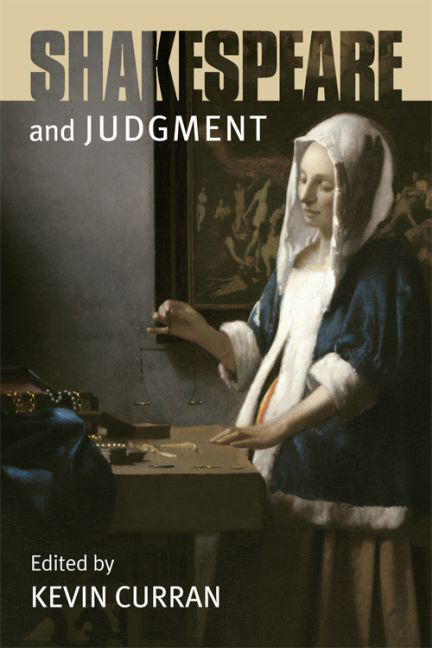Book contents
- Frontmatter
- Contents
- Acknowledgments
- List of Contributors
- Introduction
- Part I Staging Judgment: Deliberation in the Plays
- 1 Preventive Justice in Measure for Measure
- 2 Believing in Ghosts, in Part: Judgment and Indecision in Hamlet
- 3 Shakespeare's Law and Plowden's Authority
- Part II Audience Judgment: Deliberation in the Theater
- Part III The Ethics of Judgment
- Index
1 - Preventive Justice in Measure for Measure
from Part I - Staging Judgment: Deliberation in the Plays
Published online by Cambridge University Press: 10 May 2017
- Frontmatter
- Contents
- Acknowledgments
- List of Contributors
- Introduction
- Part I Staging Judgment: Deliberation in the Plays
- 1 Preventive Justice in Measure for Measure
- 2 Believing in Ghosts, in Part: Judgment and Indecision in Hamlet
- 3 Shakespeare's Law and Plowden's Authority
- Part II Audience Judgment: Deliberation in the Theater
- Part III The Ethics of Judgment
- Index
Summary
This chapter elaborates two major historical and legal distinctions as they relate to Shakespeare's Measure for Measure. Beginning with the character Barnardine, I demonstrate the way his fictional case refracts, and must be ethically understood through, the gap that persisted between the formal law and the so-called life of the law – not the spirit, or the law's or legislators’ intentions, but the life of the law as it was embodied in the practices of early modern communities. The gap between the letter and the life enlarged the terrain of legal judgment far beyond technical questions of fact and law and brought the results of the legal system closer to social notions of justice. An understanding of the differences between punitive law as it was represented in the statute books and as it was practiced facilitates a much more nuanced evaluation of the decision by Shakespeare's Duke to pardon the murderer Barnardine, as well as others in the play.
The life of English law was overseen primarily by Justices of the Peace, whose responsibilities included not only punitive justice but also preventive justice – the second major distinction that I treat. Preventive justice included all the deliberation and activity that took place in lieu of, before, after, and even sometimes during trials, to inhibit crime or minimize its consequences. In early modern England, maintaining social order or “keeping the peace” was not only considered a more effective and just strategy than punishing those who had broken the law, but it also engaged much more of the magistrate's time and effort. Yet in legal studies no less than cultural studies, preventive justice has received scant attention. If we over-identify justice with trials, and over-identify trials with the goals of conviction and punishment, a study of the principles and practices of preventive justice offers a new focus for a cultural study of the law that brings with it a distinct operational ethics. The second section of this chapter unpacks the history of preventive justice to provide a new historical, legal, and ethical context with which to evaluate Shakespeare's magistrates.
- Type
- Chapter
- Information
- Shakespeare and Judgment , pp. 21 - 44Publisher: Edinburgh University PressPrint publication year: 2017

